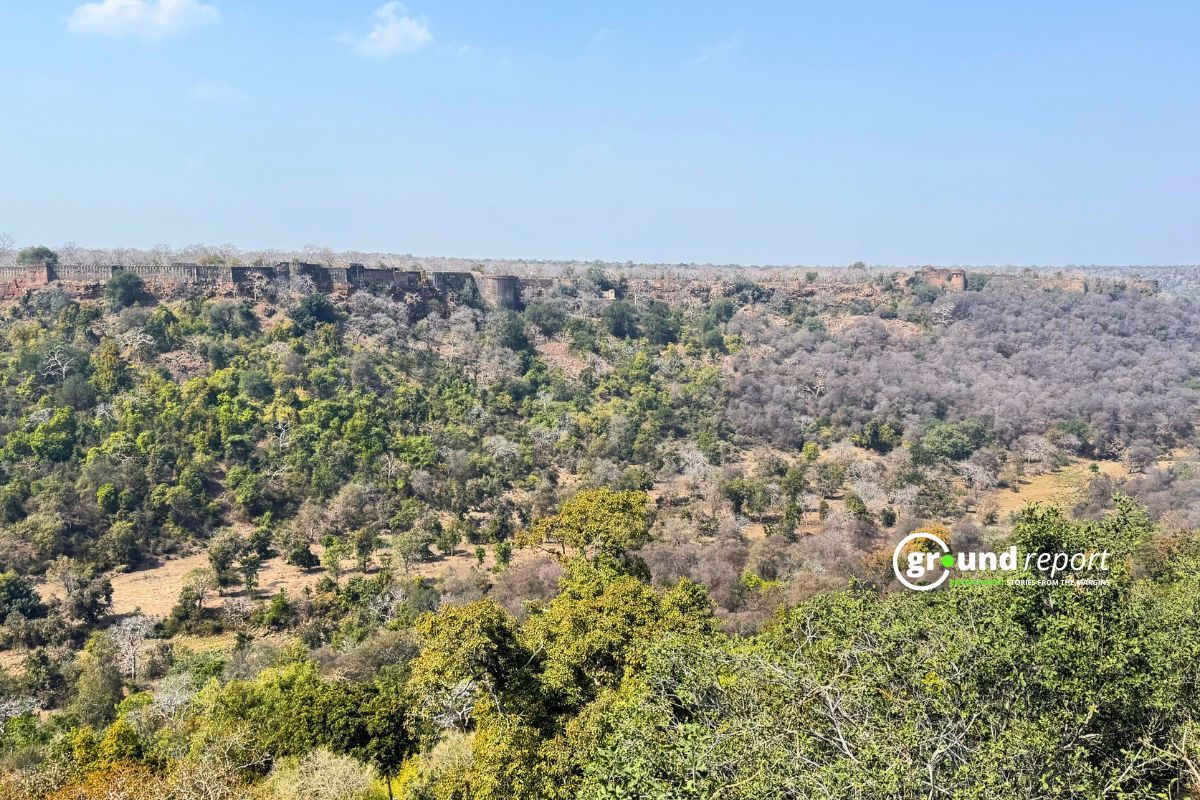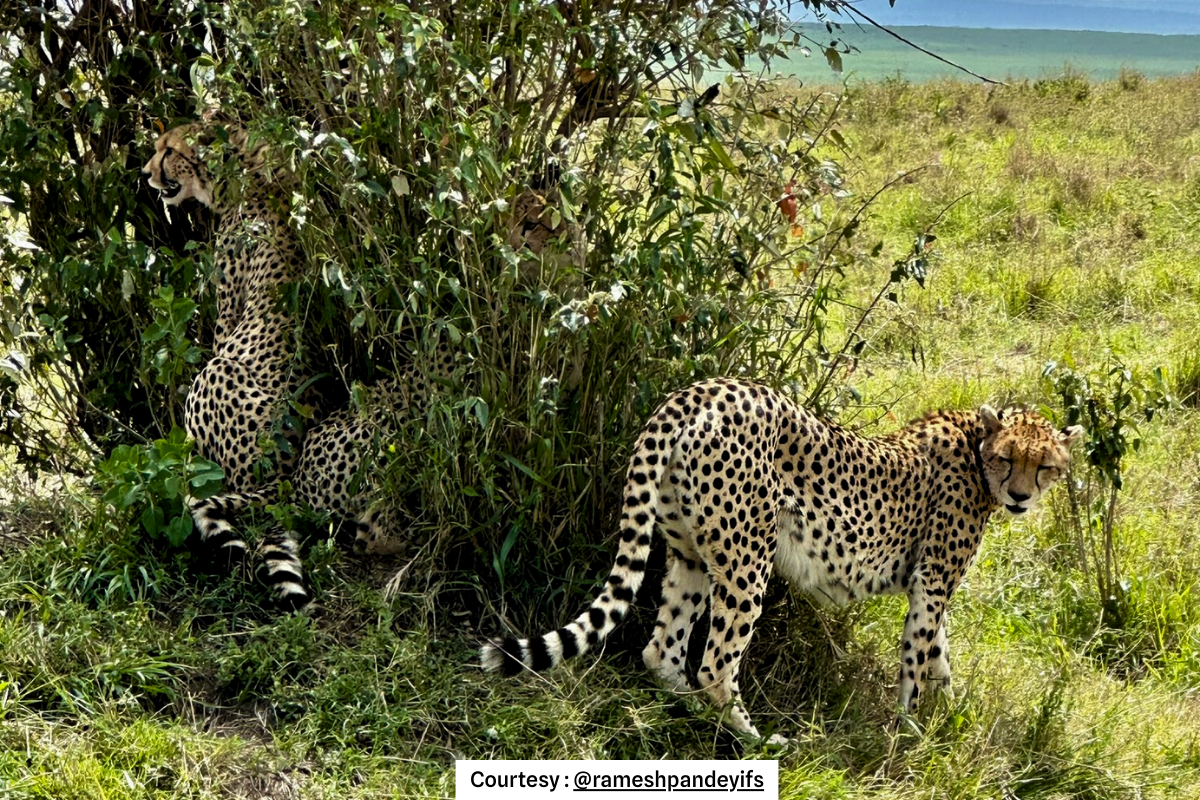The proposed hydropower project in Rajasthan’s Shahbad forest, which involves cutting down over 1.19 lakh trees, has raised concerns among environmentalists, local communities, and wildlife conservationists. This development poses a potential threat to India’s Cheetah Rehabilitation Project in Madhya Pradesh, as the Shahbad forest is located near the Kuno National Park, where cheetahs have been reintroduced after 70 years.
Rajasthan government has approved felling of over 1 lakh trees in the Shahabad Conservation Reserve of Baran district for the construction of a 1,800MW hydro power project owned by a private company.
According to experts, this isn’t just about cutting down a few trees—it threatens to undermine the foundation of the proposed 17,000-square-kilometre cheetah corridor central to the Madhya Pradesh Cheetah Project that spreads across three states– Madhya Pradesh, Rajasthan, and Uttar Pradesh.
This emerging corridor is touted to become the world’s largest cheetah habitat. Rajasthan contributes 6,500 square kilometers to the corridor, with the Shahabad forest serving as a critical link in this expansive landscape.

The massive tree felling will not only harm the biodiversity and carbon absorption capacity of the region. It also poses a grave threat to the long-term success and freedom of movement of the cheetah population in Madhya Pradesh.
Hydro project and Shahabad forest
The Ministry of Environment, Forest and Climate Change (MoEFCC) has approved the Shahpur Pump Storage Project in Shahabad Tehsil to Greenko Energies Private Limited, a Hyderabad-based company. The project is an off-stream closed-loop system in which two reservoirs will be constructed. Water will be pumped from the Kuno river to fill the lower reservoir. The project has a capacity to generate 1,800 MW of electricity. It will have seven French turbines (five 300 MW and two 150 MW).
The project is spread over 624.17 hectares of land, including 408 hectares of forest. This forest falls under the Shahabad Conservation Reserve. The forest is located on the border of Madhya Pradesh and Rajasthan. It plays an important link for the uninterrupted movement of cheetahs from Kuno National Park to Gandhi Sagar Sanctuary. It is not just a group of trees and plants, but a priceless treasure of biodiversity.
Species protected under Schedule-1 of the Wildlife (Protection) Amendment Act 2022 reside in this area. Such as rare species like rusty spotted cat, chinkara, striped hyena. Countless medicinal plants are found here. The bio hotspot absorbs about 22.5 lakh metric tonnes of carbon dioxide annually, which plays a vital role in achieving India’s climate change goals. In contrast, the barren land of Jaisalmer selected for alternative afforestation can absorb only 3,500 metric tonnes of carbon, which is negligible compared to the environmental damage.
Legal-social battle and livelihood of communities
The villagers of Shahbad consider this forest not just a cluster of trees but their lifeline. Their fight against this destructive project continues at the legal and social level. Meanwhile, the Rajasthan High Court has taken suo motu cognisance of this plan in Shahbad in October 2024 and directed the government to conduct an environmental impact study. Local villagers and environmental activists are jointly doing everything possible to save this forest. They have started a campaign named #SaveShahbad. Hundreds of people are participating in this protest, including women and children.

Forty-two-year-old Ramlal, a resident of Hanuwat Kheda village in Chhabra tehsil of Rajasthan’s Baran district, is among those protesting the proposed hydro project. His village is directly affected by the plan. Ramlal, who relies on the forest for his livelihood, fears the large-scale deforestation will leave his family with no means to survive. ‘Our lives depend on this forest—it provides us with medicinal plants, firewood, and sustains our daily needs. Cutting it down is like cutting off our lifeline,’ he says.
Another villager, 34-year-old Meena Devi, joins the protest and expresses her concern: “This forest holds the future of our children.” Why does the government want to leave us homeless?”
Environmentalists warn that the proposed deforestation poses a grave threat to both India’s Cheetah Rehabilitation Project and its broader climate goals. Neelam Ahluwalia, a member of the National Alliance for Climate and Ecological Justice (NACEJ), emphasises the stakes: “The destruction of Shahabad will break the backbone of the cheetah corridor. This forest serves as the lifeblood of central India, and its destruction would constitute an unforgivable offence.
Water conservationist Rajendra Singh says with determination, “Our fight is not just to save the forest, but it is also a fight for our rights. We will raise our voice on every platform.”
Cheetah Corridor Project
The Cheetah Corridor Project, which starts from Kuno National Park in MP and extends to Mukundra Hills Tiger Reserve, Ranthambore and Gandhi Sagar Sanctuaries in Rajasthan, is an important step for India’s cheetah conservation project.
The corridor covers Shivpuri, Sheopur, Gwalior, Morena, Ashoknagar, Guna, Neemuch and Mandsaur in Madhya Pradesh, while Baran, Sawai Madhopur, Kota, Karauli, Jhalawar, Bundi and Chittorgarh districts in Rajasthan and Jhansi and Lalitpur districts in Uttar Pradesh.
The corridor will cover a total area of 17,000 square kilometres. Work on the corridor has already begun, especially on the stretch between Kuno and Gandhi Sagar. 54,249 hectares of forest area is being added to Kuno National Park, which will increase the habitat for the cheetah. The corridor is expected to take five years to complete.

Apart from this, a joint committee has been formed between Rajasthan and Madhya Pradesh, which is responsible for the development and management of the corridor. This committee includes the Chief Wildlife Wardens of both the states, the Director of the Cheetah Project and a representative of the Wildlife Institute, Dehradun. The work of the committee is to prepare an agreement for the corridor, evaluate joint tourism routes and suggest measures for the movement of cheetahs.
What does this mean for the future of cheetahs?
20 cheetahs were brought from Namibia and South Africa to Kuno National Park under the Cheetah Project, which started in 2022, but ten died (seven adults, three cubs). Which has happened mainly due to disease, lack of environmental adaptation and natural causes. Currently, Kuno has a population of 13 cheetahs and the project aims to establish a stable population of 50-60 cheetahs by 2035. However, wildlife experts believe that without a wide corridor, the range of cheetahs will remain limited, which could endanger the long-term success of this ambitious project. The proposed hydro power project in Shahabad will further increase this risk, as it is an important link for the movement of cheetahs.
The 2024 report of the National Tiger Conservation Authority (NTCA) also underlines the need for this corridor as cheetahs have started moving from Kuno to the borders of Rajasthan and Uttar Pradesh.

Citing the protection of forests as a national priority, wildlife scientist Dr. Yadvendradev categorically states,
“Expansion of the cheetah corridor will allow cheetahs to spread over a larger area. This is essential for the growth of their population. But the loss of sensitive forests like Shahabad will fragment this corridor.”
Highlighting the far-reaching consequences of the proposed hydro power project in Shahabad, environmentalist Dr. Ravi Sharma warns, “The destruction of the Shahabad forest threatens not just the future of cheetahs, but also jeopardizes India’s carbon neutrality goals. Cutting down over 400,000 trees will have a massive and lasting impact on the climate.”
Support us to keep independent environmental journalism alive in India.
Keep Reading
‘Forever Chemicals’ found in all the world’s toilet paper
Trump shuts down staff helping families pay heating bills
Full list of words banned by Trump, including ‘Climate Change’
Oil companies seek Trump’s help to fight climate lawsuits & regulations
Follow Ground Report on X, Instagram and Facebook for environmental and underreported stories from the margins. Give us feedback on our email id greport2018@gmail.com.
Don’t forget to Subscribe to our weekly newsletter, Join our community on WhatsApp, and Follow our YouTube Channel







